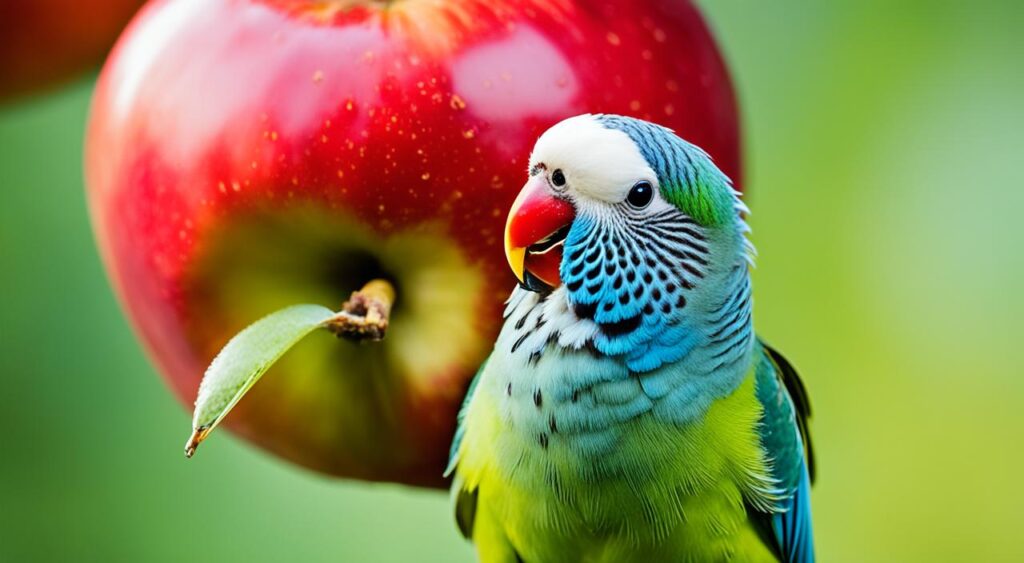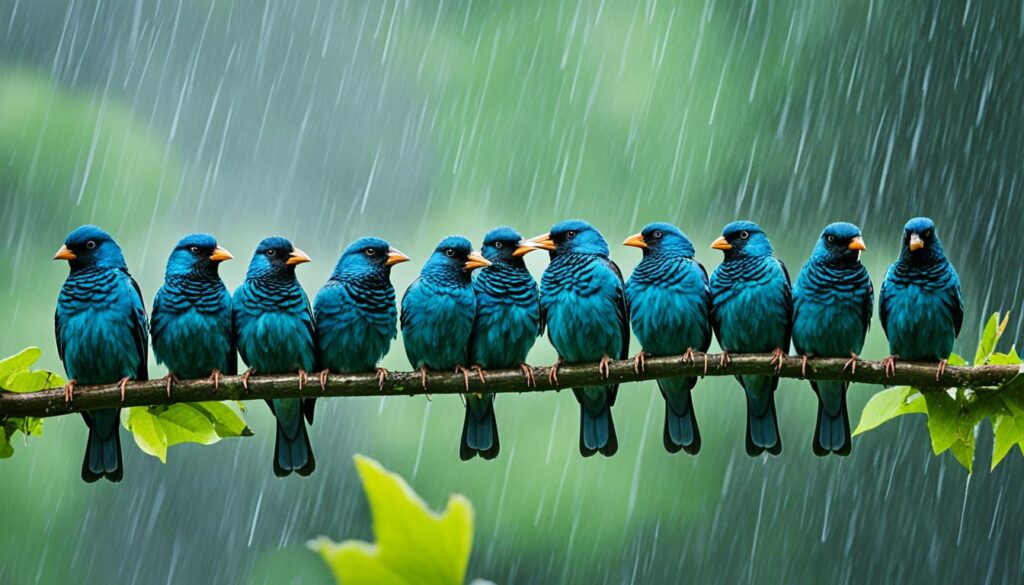As a bird owner, you might ask: Can my parakeet safely enjoy an apple? The answer is yes, but with some precautions. Apples can be a great treat for your bird, packed with nutrients. We’ll cover the benefits, risks, and how to feed apples to your parakeet safely.
Key Takeaways
- Apples can be a safe and nutritious treat for parakeets when fed in moderation.
- Apples are a good source of vitamins, minerals, and fiber that can benefit a parakeet’s health.
- The seeds and pits of apples contain cyanide, which can be toxic to parakeets, so it’s important to remove them before feeding.
- Owners should be aware of any potential air quality issues or other toxic foods that could harm their parakeet when introducing new foods.
- Proper preparation, such as washing and peeling the apple, is crucial to ensure your parakeet’s safety and well-being.
Can Parakeets Eat Apples?
Parakeets can have apples as an occasional treat. Apples are safe for them and offer some health benefits when given in small amounts. But, there are things to remember when giving apples to your bird.
Apples can be a great addition to a parakeet’s diet, offering health benefits as an occasional treat. They need a mix of seeds, pellets, fruits, and veggies for a balanced diet. Apples can be a nice extra.
- Apples are full of vitamins like vitamin C, which helps the immune system. They also have vitamins A and E for good vision and skin.
- The water in apples helps parakeets stay hydrated and aids digestion.
- The fiber in apples helps with digestion and keeps the gut healthy in parakeets.
But, it’s important to watch out for risks when giving apples to parakeets. The seeds and core have cyanide, which is bad for birds. So, always take out the seeds and core before giving apples to your parakeet.
Also, wash apples well before giving them to parakeets to remove pesticides. Some parakeets might be allergic to apples, so watch them closely after trying new foods.
“Apples can be a healthy treat for parakeets, but it’s important to take the necessary precautions to ensure their safety.”
Give your parakeet small apple pieces as a treat, not a main food. By doing this and following these tips, you can give your bird a tasty and healthy snack.
Nutritional Benefits of Apples for Parakeets
Apples are a tasty treat for parakeets and offer many health benefits. They are full of vitamins and minerals that help keep your bird healthy.
Vitamins and Minerals in Apples
Apples are packed with vitamin C, which boosts the parakeet’s immune system and supports feather health. They also have vitamin A, important for eyesight and skin health. Plus, apples have vitamin K, which aids in blood clotting and bone health.
Apples are also full of antioxidants. These help fight off free radicals and protect your parakeet’s cells. Antioxidants can also help your bird live a longer, healthier life.
Fiber Content of Apples
Apples are a great source of fiber for parakeets. This fiber supports their digestive health and helps with regular bowel movements. Parakeets need a balanced diet to avoid digestive problems.
While apples are a healthy snack for parakeets, they should be given in moderation. Eating too many apples can cause digestive problems. It’s best if apples make up only 5-10% of their daily food.
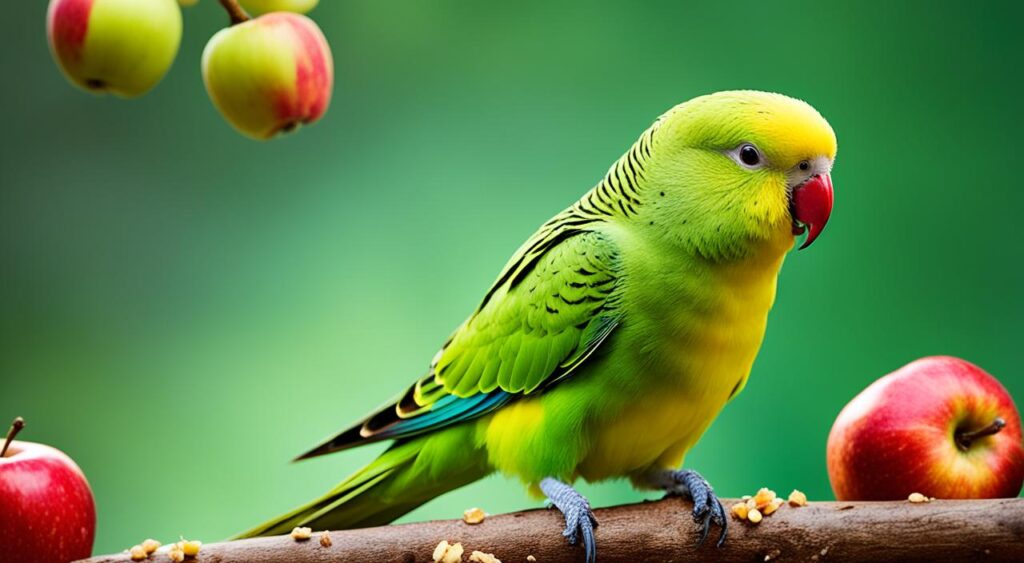
Feeding your parakeet apples in the right amount gives them a tasty, nutritious treat. This supports their health and happiness.
Moderation is Key When Feeding Apples to Parakeets
Apples can be a great addition to a bird diet for parakeets, but only in small amounts. The high sugar content can lead to digestive issues if given too much. It’s best to introduce safe fruits for birds like apples slowly and watch how your bird reacts.
A balanced parrot treats diet should be about 75 percent pellets and 25 percent healthy, low-fat table foods. Small birds need about ¼ cup of pellets daily, while bigger parrots might need ½ cup. For fruits, give small birds ½ to 1 teaspoon and larger birds 1 tablespoon.
“Moderation is crucial when feeding seeds as treats. Seeds and nuts should not be a primary part of a pet bird’s diet, as they are high in carbohydrates and fats and deficient in essential nutrients like calcium and Vitamin D3.”
Remember, parrot food like apples should be a small part of a parakeet’s diet. A balanced diet of pellets, fresh fruits, and veggies is key to keeping your bird healthy and happy.
Apple Seeds and Potential Toxicity
Apples can be a great snack for parakeets, but we must watch out for the seeds. Apple seeds have cyanide, which is bad for parakeets if they eat it.
Dangers of Cyanide in Apple Seeds
Eating cyanide can lead to serious health problems or even death in birds. It takes about 20 apple seeds to make 1g of Amygdalin, which has around 65 mg of Cyanide. A bird would need to eat over 50 apple seeds to face a big risk.
But, there are no reports of birds getting cyanide poisoning from apple seeds. Cyanide doesn’t build up in birds because their liver and kidneys quickly get rid of it. So, giving apples with seeds to birds is safe, needing a lot of seeds to be harmful.
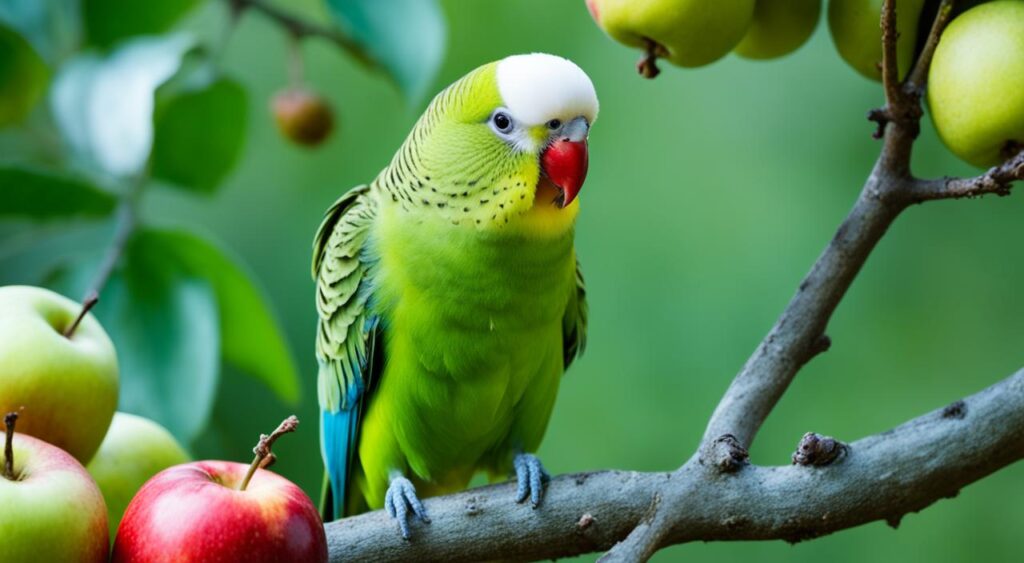
Even though the chance of cyanide poisoning from apple seeds is low, it’s good to remove the seeds before giving apples to your parakeet. This keeps your bird safe and healthy.
Safe Fruit Alternatives for Parakeets
Apples can be a good snack for parakeets, but there are safer fruit options too. These fruits are good for parakeets and don’t have cyanide. Pet owners should try different safe fruits for birds, parrot-friendly foods, and healthy snacks for parakeets.
Berries like blueberries, raspberries, and blackberries are great for parakeets. They’re full of antioxidants, vitamins, and fiber. Parakeets love the sweet and tangy taste of these fruits. Melon, including watermelon and cantaloupe, is also a good choice. It’s refreshing and gives parakeets important vitamins and minerals.
Pear is another safe fruit for parakeets. Like apples, pears are high in fiber and have many vitamins and minerals. But, introduce new safe fruits for birds slowly and in small amounts. Parakeets may like different fruits and have different stomachs.
- Berries (blueberries, raspberries, blackberries)
- Melon (watermelon, cantaloupe)
- Pear
“Providing a variety of healthy snacks for parakeets can not only nourish your feathered friend but also foster a stronger bond through positive reinforcement and enrichment.”
Adding different safe fruits for birds to a parakeet’s diet helps them get the vitamins, minerals, and fiber they need. Always talk to an avian vet to make a diet plan that fits your parakeet’s needs.
Preparing Apples for Parakeet Consumption
Feeding parrot food to your parakeet is important. Apples can be a great, tasty, and nutritious choice for them. But, you must prepare them correctly to keep your bird safe.
Washing and Peeling Guidelines
Always wash the apples before giving them to your parakeet. This removes harmful pesticides. Also, take off the skin and seeds because they have cyanide, which is bad for parakeets.
- Wash the apples under running water to remove dirt, chemicals, and other harmful stuff.
- Peel the apples, making sure all skin is off.
- Cut the apples into small pieces so they’re easy for your parakeet to eat.
These easy steps make apples a safe and fun treat for your parakeet. They also give your bird important nutrients.
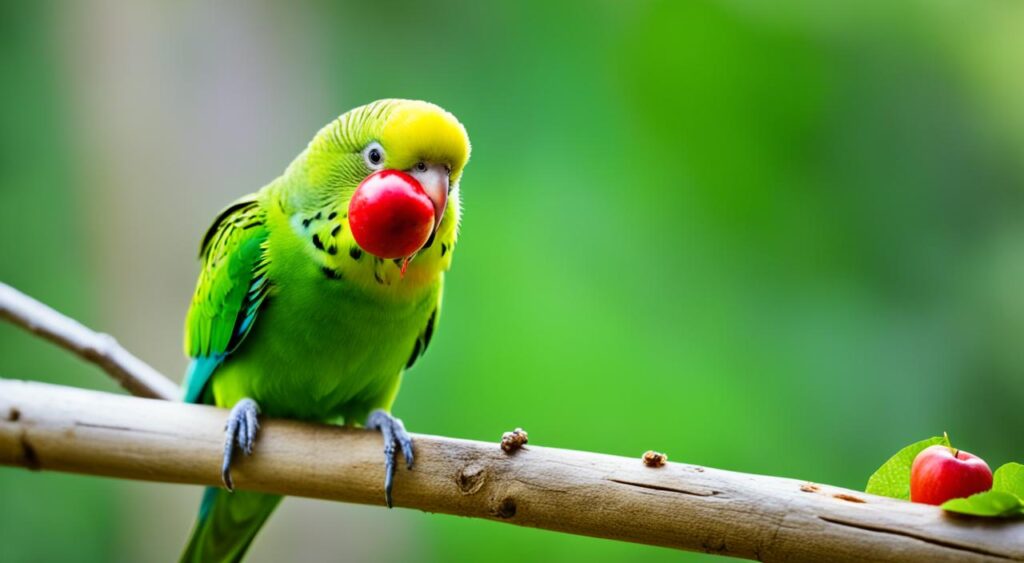
When you add new fruits to your parakeet’s diet, watch how they react. Make sure they like the food before it becomes a regular part of their diet.
Incorporating Apples into a Balanced Parakeet Diet
While apples are a tasty treat for parakeets, they shouldn’t be the main food. Parakeets need a balanced parrot food diet for their complex avian nutrition needs. Only about 30% of parakeet owners add parrot-friendly foods like apples to their bird’s bird diet.
Apples add important vitamins and minerals to a parakeet’s diet of pellets, seeds, and veggies. They have more vitamin C and fiber than many other parrot food choices. Adding apples as a treat can boost parakeets’ health and happiness.
But remember, apples shouldn’t be a big part of a parakeet’s diet. Experts say to give apples to parakeets just a few times a week. This keeps their diet varied and balanced, avoiding digestive problems.
“Apples can be a delightful and nutritious treat for parakeets, but they should not replace the essential elements of a balanced bird diet,” explains Dr. Avian Vet, a leading expert in parrot food and parrot-friendly foods.
Talking to an avian vet is the best way to make sure your parakeet gets the right foods for its health. Adding apples to a balanced diet helps your parakeet live its best life.
Bird-Safe Apple Treats and Recipes
Parakeets can enjoy many healthy and tasty treats, like parrot treats made with apples. These healthy snacks for parakeets add nutrition and fun to their diet. Making your own apple treats lets you give your birds the best of apples safely.
Baked Apple Chips
Baked apple chips are a favorite among parakeets. Just slice apples thin, put them on a baking sheet, and bake until they’re crispy. Make sure to take out the seeds and cores because they’re not safe for parakeets. These chips are crunchy and tasty, and parakeets love them.
Apple Slices with Seed Mixture
Apple slices with a safe seed mix are another great choice. This mix offers a mix of nutrients and tastes parakeets like. Start by washing the apples, then slice them. Sprinkle a bit of a good seed blend over the slices.
Remember, treats should be given in small amounts as part of a balanced diet. Parakeets can enjoy these apple-based snacks, but they shouldn’t eat too many.
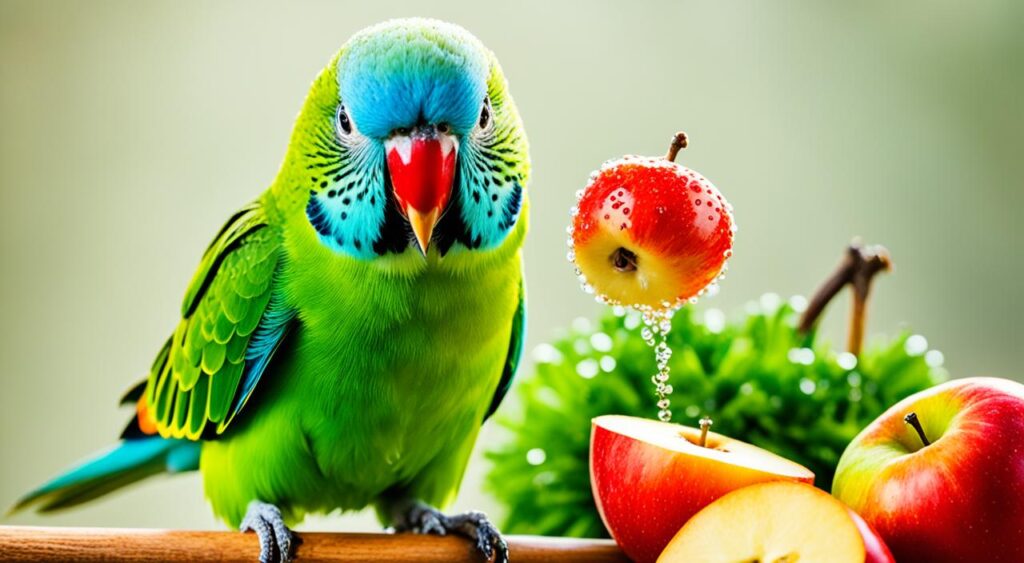
“Apples can be a wonderful and nutritious treat for parakeets when prepared and served appropriately.”
Air Quality Concerns When Introducing New Foods
When adding new foods, like apples, to a parakeet’s diet, pet owners must think about air quality. Parakeets are very sensitive to toxins in the air. They can get sick from chemicals, fumes, or pollutants. It’s important to keep the air clean and avoid harmful products near the bird.
Good avian nutrition and air quality are key for parakeets. These birds can easily get breathing problems. Even small changes in the air can affect their health. Pet owners should make a safe and healthy home for their birds.
- Avoid using harsh cleaning products, aerosols, or other chemicals near the parakeet’s cage.
- Ensure the bird’s living area is well-ventilated, with good air circulation and filtration.
- Monitor the bird’s behavior and watch for any signs of respiratory distress or sensitivity when introducing new foods.
By focusing on a parrot-friendly environment and air quality, pet owners can help their parakeets eat safely and healthily.
“Maintaining a clean, well-ventilated living space is crucial for the health and happiness of pet parakeets.”
A balanced diet and a safe home are important for parakeets. By thinking about air quality and changing their food slowly, pet owners can help their birds do well.
Signs of Apple Intolerance in Parakeets
Apples can be a great treat for parakeets, but some birds might not like them. Pet owners should watch for signs of trouble and stop giving apples if their parakeet reacts badly.
Digestive Issues
Parakeets that don’t like apples might have diarrhea, vomiting, or belly pain. These problems can make them dehydrated and not get enough nutrients.
Behavioral Changes
Parakeets might also act differently if they don’t like apples. They might seem tired, less playful, or show they don’t want to eat parrot food. These changes could mean they have a diet problem.
If a parakeet shows any of these signs, stop giving them apples. Keep an eye on their health. If problems don’t go away, see a vet to help your bird.
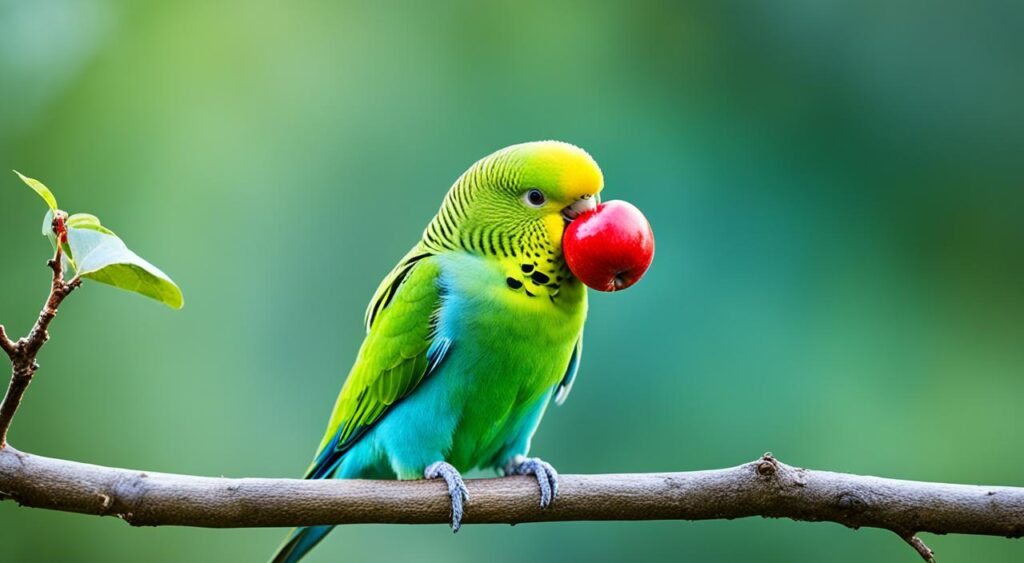
“Paying attention to your parakeet’s response to new foods is crucial for maintaining their health and happiness.”
Toxic Foods to Avoid for Parakeets
While apples can be a healthy snack for parakeets, some foods are off-limits. Items like avocado and chocolate are dangerous. They contain toxins that can harm parakeets. It’s important for owners to know which foods are toxic for parakeets.
Avocado and Chocolate Dangers
Avocado has a toxin called persin that can cause serious health problems. Chocolate has theobromine, a stimulant that is toxic to parakeets. It can lead to seizures, heart issues, and breathing problems.
Other foods to avoid include onions, garlic, caffeine, alcohol, and some nuts and seeds. Feeding your parakeet safe fruits and veggies is best for their health.
Even a little bit of these toxic foods can harm your parakeet. As pet owners, we must watch out for dangers in their food and surroundings.
Consulting with an Avian Veterinarian
Talking to an avian veterinarian is key for a parakeet’s diet and health. These experts offer great advice on safe and healthy foods. They also spot health issues or special dietary needs your bird might have. It’s important for parakeet owners to team up with their avian vet for top-notch care.
Avian vets know a lot about avian nutrition. They guide parakeet owners on the right mix of fruits, veggies, and more for a parrot-friendly environment. They can also spot signs of illness in parakeets linked to diet, like stomach problems or changes in behavior.
“Regular consultations with an avian veterinarian are essential for the health and well-being of your parakeet. These professionals can provide tailored guidance to ensure your bird’s dietary and environmental needs are met.”
Before adding new foods, like apples, to your parakeet’s diet, check with a vet first. They’ll tell you the right amount, how often to give it, and any risks or benefits. This keeps your parakeet’s nutrition right and their environment safe and fun.
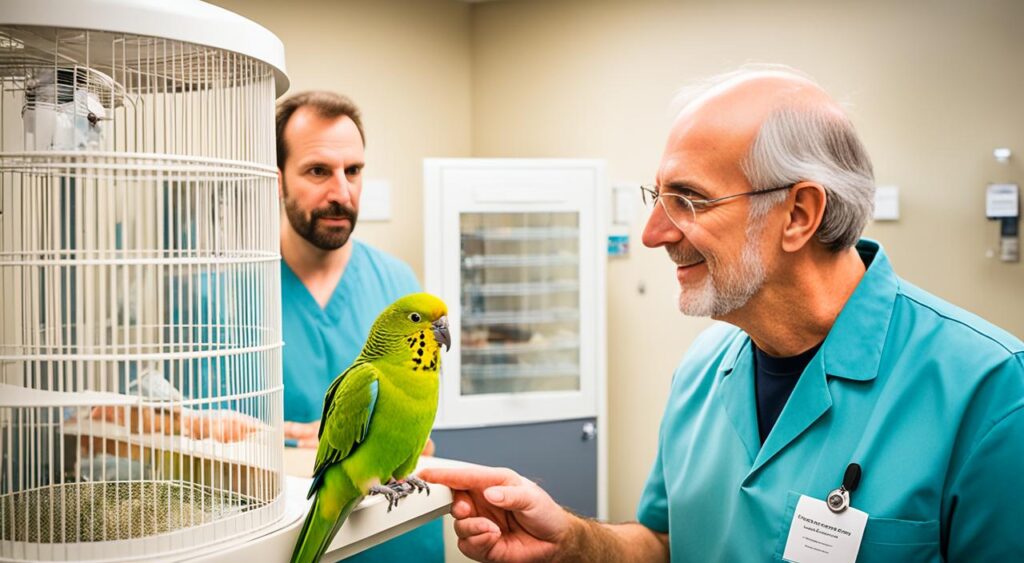
Avian vets can also spot signs of illness in parakeets tied to diet or environment changes. Quick vet care can stop bigger health problems, keeping your parakeet happy and healthy.
With an experienced avian vet’s help, parakeet owners can be sure they’re giving their birds the best care. This includes a diet that’s good for their avian nutrition and parrot-friendly environment.
Creating a Safe and Enriching Environment for Parakeets
Providing a balanced avian nutrition is key, but so is making a parrot-friendly environment. Parakeets are smart and social birds. They need a place that keeps them busy and happy. With the right toys, perches, and activities, your parakeet can live a happy and stress-free life.
Providing Toys and Perches
Parakeets love to chew, so they need lots of toys. Give them toys made of natural stuff like wood, seagrass, and sisal. Change these toys often to keep your parakeet interested. Also, give them different perches to move around on.
- Chew toys made of untreated wood or natural fibers
- Ladders, swings, and climbing structures
- Foraging toys that encourage natural foraging behaviors
- Mirrors and bells for visual and auditory stimulation
Keeping your parakeet’s space safe and fun can help prevent signs of illness in parakeets. This includes things like feather plucking or being mean. It also helps them stay healthy in body and mind.
“A well-designed habitat can help reduce stress and promote overall physical and mental well-being in parakeets.”
By focusing on a parrot-friendly environment, you make a great home for your parakeet. Always watch how your bird acts and change things as needed. This makes sure they have what they need to be happy and healthy.
Conclusion
Apples can be a great treat for can parakeets eat apples if given in small amounts and prepared right. Knowing about apple nutrition for parakeets and the risks helps owners give their birds a healthy snack. It’s also important to talk to a bird diet expert and make a safe home for your parakeet.
Apples have many apple benefits for birds, but they should be balanced with other safe fruits for birds and a varied parrot food diet. Following advice and being careful with healthy snacks for parakeets lets parakeet owners give apples as a parrot treats. This makes feeding time fun and nutritious for the birds.
For a happy parakeet, you need a balanced diet, a safe home, and good care. By keeping up with advice and expert opinions, parakeet owners can help their birds live long, healthy lives.
FAQ
Can parakeets eat apples?
Yes, parakeets can eat apples in moderation. They are a good source of vitamins and minerals. These can help keep your parakeet healthy.
What are the potential risks of feeding apples to parakeets?
Apples have seeds and pits that contain cyanide. This can be harmful to parakeets. Make sure to remove these parts before giving apples to your bird.
What are the nutritional benefits of apples for parakeets?
Apples offer vitamins C, A, K, and antioxidants. They also have fiber, which supports your parakeet’s health and digestion.
How much apple should I feed my parakeet?
Feed apples as an occasional treat, not as a main food. Too much sugar can cause digestive problems.
What other fruits are safe for parakeets to eat?
Safe fruits for parakeets include berries, melon, and pear. Feed them in moderation as part of a balanced diet.
How should I prepare apples for my parakeet?
Wash the apples well and remove the skin and seeds before giving them to your parakeet. This removes the risk of cyanide toxicity.
What other factors should I consider when feeding apples to my parakeet?
Watch out for air quality issues and signs of digestive problems or allergic reactions. These can happen if your parakeet eats apples.
What other foods are toxic to parakeets?
Avoid giving parakeets avocado and chocolate. They are toxic. Always check a list of unsafe foods for your bird’s health.
When should I consult an avian veterinarian about my parakeet’s diet?
Always talk to an avian vet to make sure your parakeet gets the right diet. They can help with health and diet questions.
How can I create a safe and enriching environment for my parakeet?
Use a variety of toys, perches, and natural behaviors like foraging and chewing. This makes a healthy and fun home for your parakeet.
